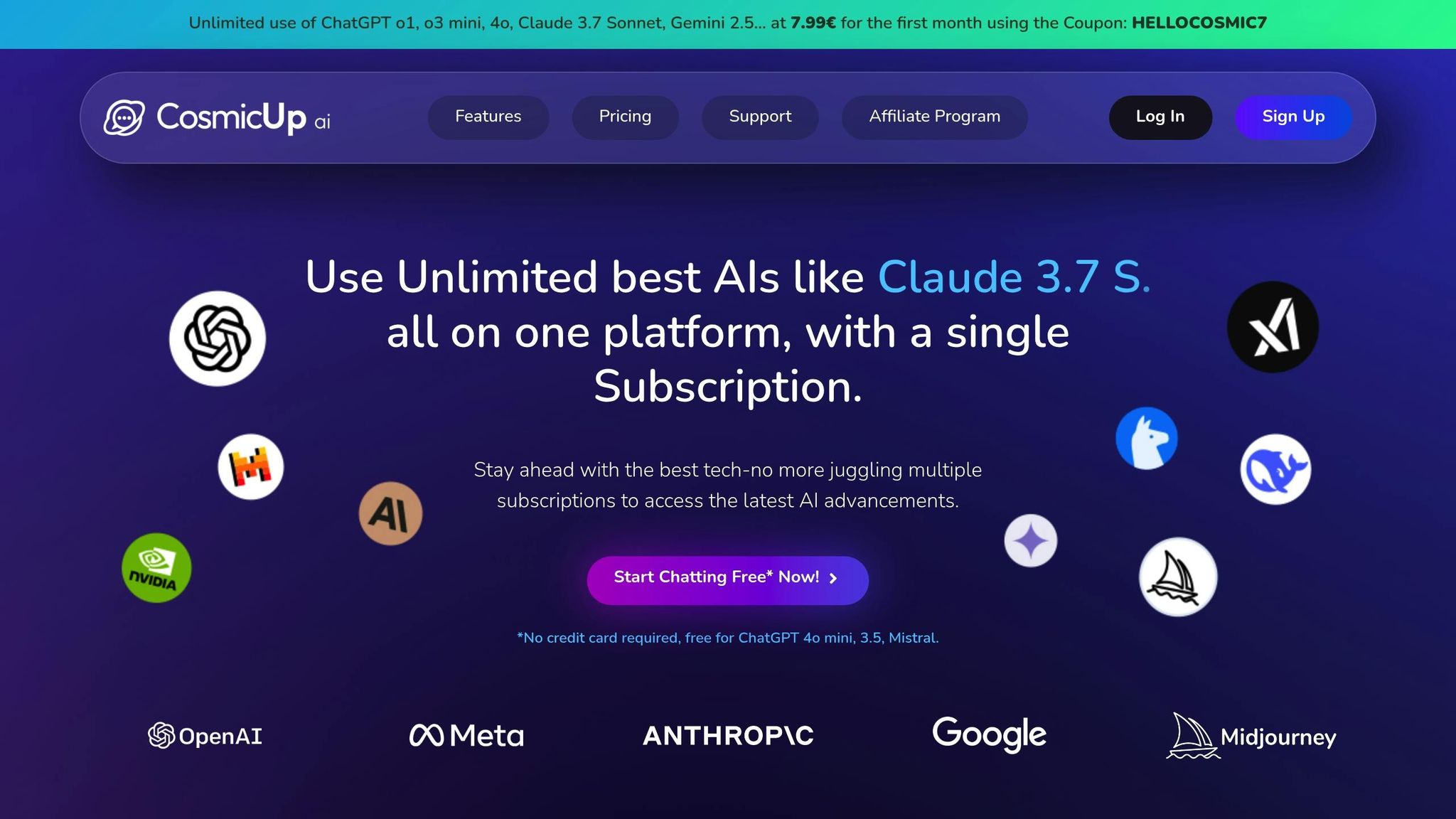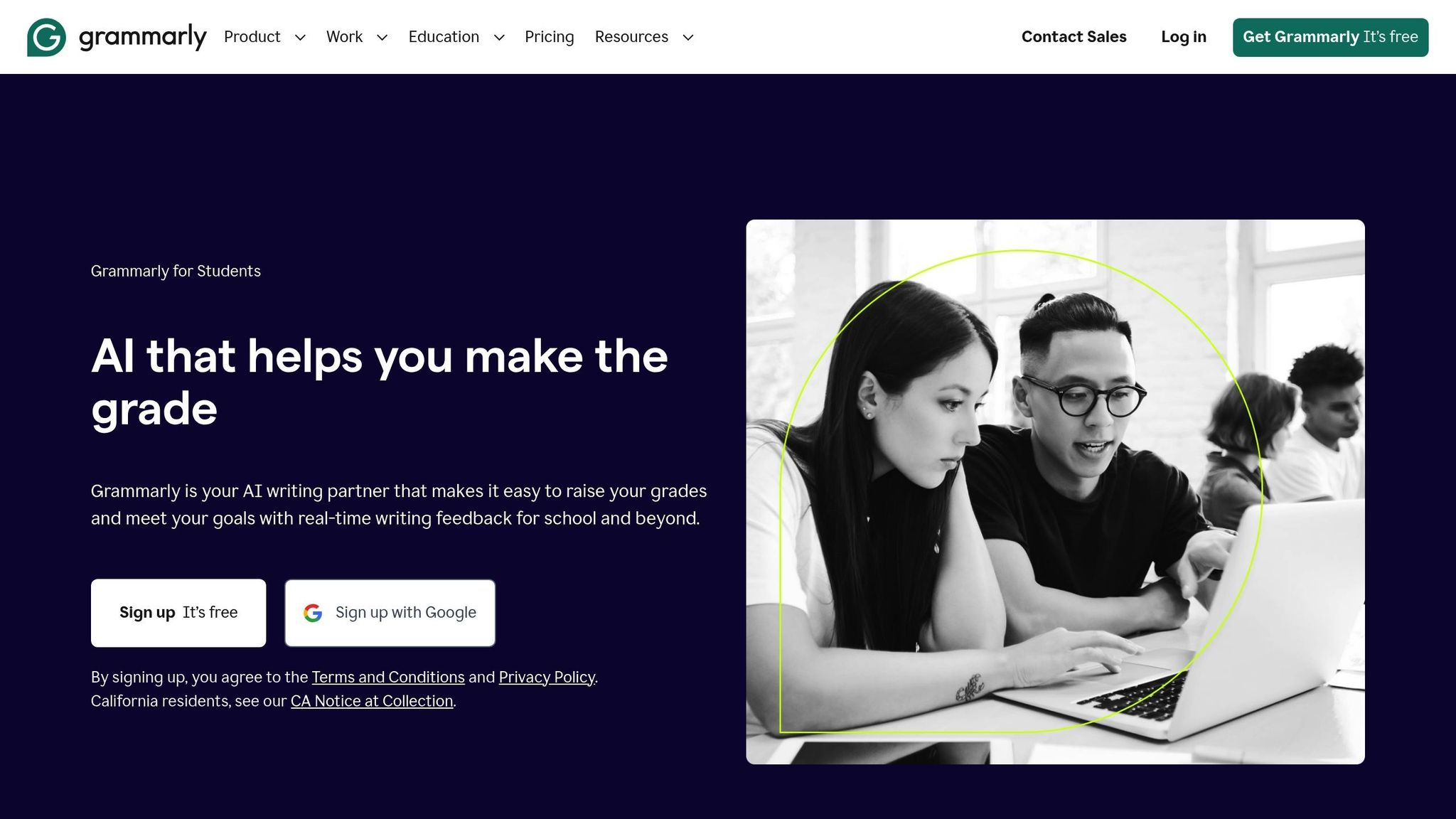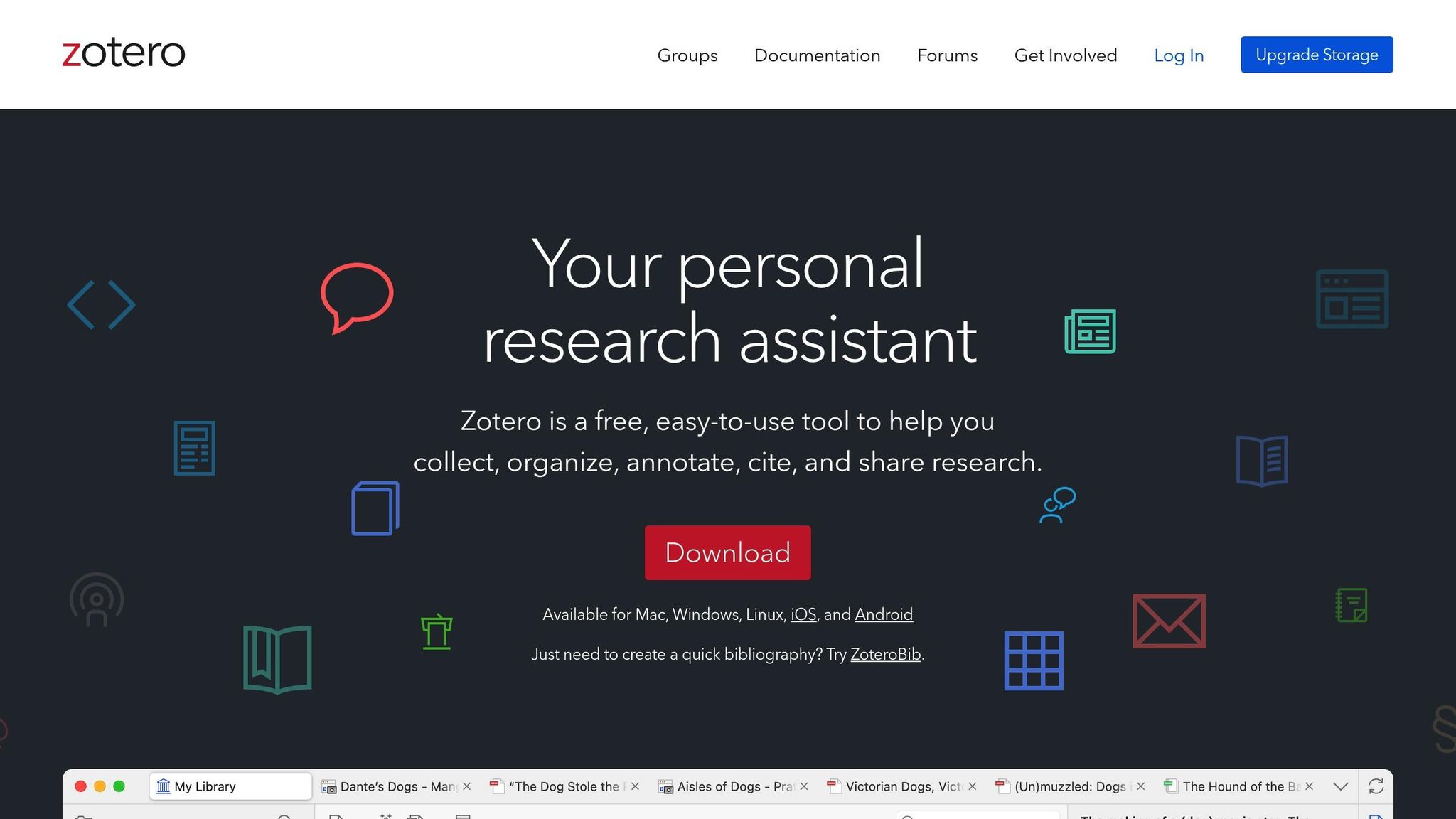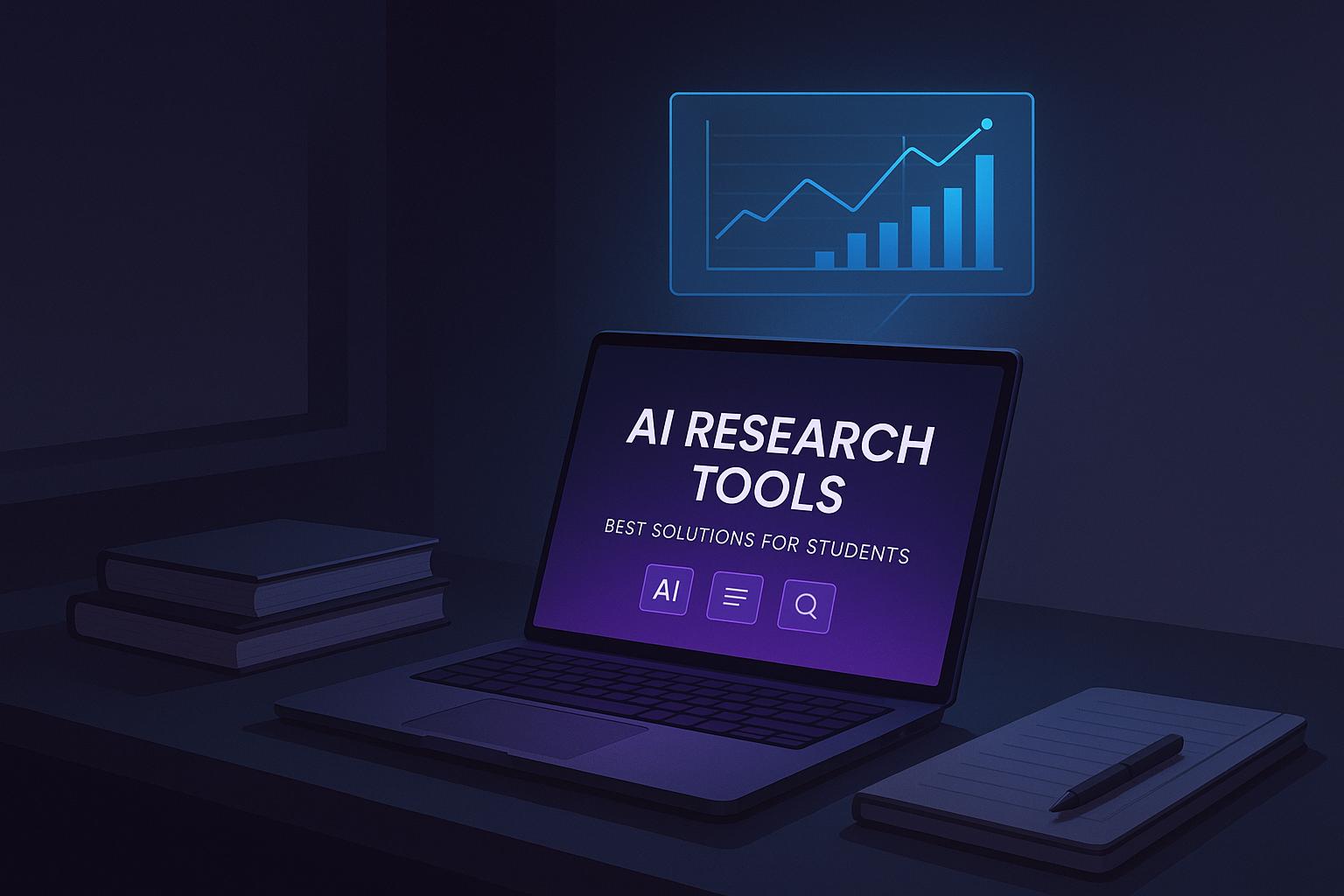Students today rely on AI tools to simplify research, manage citations, and improve writing. Tools like CosmicUp, Grammarly, and Zotero stand out for their ability to save time and improve academic work. Here’s a quick breakdown:
- CosmicUp: Combines multiple AI models (e.g., ChatGPT, Claude) for document analysis, summarization, and note organization. Starts at $0/month, with premium access for $14.99/month.
- Grammarly: Focuses on writing improvement with advanced grammar checks, customizable summaries, and citation support. Free and premium plans available, starting at $12/month annually.
- Zotero: Free reference management software with robust citation tools and research organization features. Paid storage plans start at $20/year.
Quick Comparison
| Tool | Key Features | Pricing | Best For |
|---|---|---|---|
| CosmicUp | AI-powered summaries, note folders | $0-$14.99/month | Comprehensive research tasks |
| Grammarly | Writing assistance, tone adjustment | $0-$12/month (annual) | Writing and summaries |
| Zotero | Citation management, PDF annotation | Free-$120/year | Citation and research storage |
If you need an all-in-one research assistant, CosmicUp is ideal. For writing-focused tasks, Grammarly is a solid choice. For citation-heavy projects, Zotero provides excellent organization.
AI Tools Academics SWEAR By (and the Ones to AVOID!)
1. CosmicUp

CosmicUp is a one-stop AI platform that combines several top-tier AI models under a single subscription. For students, this means seamless access to tools like ChatGPT, Claude, Gemini, Midjourney, and DALL-E – all from one interface. It’s designed to handle a variety of file formats, including PDFs, DOC files, CSV spreadsheets, Markdown documents, text files, web URLs, and even YouTube videos. This wide-ranging compatibility makes it a powerful tool for advanced features like dynamic summarization and visual mind mapping.
Summarization Features
CosmicUp takes summarization to the next level by integrating AI-driven summaries with visual mind mapping. It transforms documents into structured, hierarchical mind maps that break down main topics and supporting details. The AI pinpoints key themes and organizes related information into logical branches, all while maintaining the original structure of the document. Additionally, the AI Explain feature offers in-depth insights directly within the mind map, making complex topics easier to digest [2].
Note Organization
Keeping research organized is effortless with CosmicUp. The platform allows users to group AI interactions into subject- or project-specific folders. Whether it’s for a single project, a semester’s worth of research, or multiple subjects, this system ensures related notes and document analyses stay neatly categorized. With unlimited chat history, students can revisit past sessions anytime, ensuring no valuable insight gets lost. These organizational tools, paired with its budget-friendly pricing, make CosmicUp a practical choice for students.
Pricing
CosmicUp has three pricing options to suit different budgets:
| Plan | Price | Key Features | Limitations |
|---|---|---|---|
| Free | $0/month | ChatGPT 4o mini, 3.5 turbo, Mistral 8B | Limited to free models only |
| Plus | $14.99/month | Access to all premium models (ChatGPT 4.1, Claude 3.5, Gemini 2.5 Pro, Midjourney, DALL-E) | Speed slows after 2M input characters/month |
| Yearly Plus | $149.90/year | Same features as Plus with 2 months free | Same as Plus Plan |
The Plus plan, priced at $14.99/month, unlocks full access to premium AI models, while the Yearly Plus plan offers the same benefits with a $30 annual savings. With unlimited context windows, CosmicUp is perfect for handling lengthy documents and extended research discussions, making it an invaluable tool for boosting academic productivity through efficient summarization and organized note-taking.
2. Grammarly

Grammarly stands out as a powerful AI-driven writing assistant, trusted by over 30 million users and 50,000 businesses worldwide. It’s designed to boost academic productivity by identifying errors with precision, summarizing content effectively, and managing citations seamlessly. In fact, Grammarly detects errors up to 10 times more accurately than standard word processors, making it an essential tool for students and professionals alike [5].
Summarization Features
Grammarly’s summarization tool simplifies lengthy texts into concise summaries without losing the original meaning [3]. Users can tailor their summaries by choosing between bullet points or paragraph formats, and even adjust the tone to match formal or academic requirements [3][4].
"Transform complex ideas into clear, concise writing with Grammarly’s summarizing tool. Easily get condensed versions of project plans, articles, and more that are simple to understand and share." – Grammarly [3]
Citation Support
Grammarly also strengthens research accuracy with its built-in citation tools. Its free citation generator formats references in APA, MLA, and Chicago styles, ensuring proper academic standards are met [6]. Additionally, features like auto-citations and the Grammarly Authorship tool help categorize text based on its source [8]. To uphold academic integrity, Grammarly encourages users to cite original sources and disclose any use of its summarization features [3].
Pricing
Grammarly offers pricing plans that cater to different budgets, making it accessible for students:
| Plan | Monthly Price | Annual Price | Key Features |
|---|---|---|---|
| Free | $0 | $0 | Basic grammar, spelling, and punctuation checks; 100 AI prompts |
| Pro | $30 | $144 ($12/month) | Includes plagiarism detection, tone suggestions, and advanced writing tools |
| Education | N/A | $108/year ($9/month) | Discounts available for eligible institutions |
Opting for annual subscriptions can lead to significant savings. For example, the Pro plan drops from $360 per year (billed monthly) to $144 annually [9]. The Education plan, priced at $9 per month, offers even more affordability, with some institutions eligible for discounts of 25–30% [9][10].
While the free version is highly functional, students tackling complex research projects may find the Pro plan’s advanced features invaluable. Robin Turner, a former English lecturer at Bilkent University, shares:
"Grammarly is immensely useful; I recommend it to my students and use it myself, especially for spotting recurring errors." [7]
sbb-itb-fb22c5a
3. Zotero

When it comes to managing references and organizing research, Zotero stands out as a powerful tool. This free software simplifies the process of collecting, organizing, and citing research sources, making it an essential companion for academic work.
"Zotero is a free, easy-to-use tool to help you collect, organize, cite, and share your research sources." – Zotero Documentation [11]
Citation Support
Zotero shines in citation management, offering compatibility with styles like Chicago, MLA, APA, and Vancouver. In fact, it supports over 8,000 journal and publisher styles [11], ensuring students can meet the specific formatting requirements of their assignments or publications.
Its Word Processor Integration feature makes citing sources effortless. With plugins for Word, LibreOffice, and Google Docs, users can insert citations directly into their documents. Zotero even generates bibliographies automatically and lets users switch citation styles for an entire document in just a few clicks [11][12].
Need to quickly add a citation? Zotero provides multiple options, including drag-and-drop, Quick Copy, or direct file export [11]. To keep things consistent, students can set their preferred citation style in the preferences menu [13]. Plus, the Zotero Connector for Chrome can automatically save full-text PDFs when available [12].
But Zotero isn’t just about citations – it also helps streamline note-taking and research organization.
Note Organization
Organizing research is easy with Zotero’s advanced tools. Students can create collections and sub-collections to structure their materials in a way that matches their project goals [14].
"Zotero helps you organize your research any way you want. You can sort items into collections and tag them with keywords. Or create saved searches that automatically fill with relevant materials as you work." – Zotero.org [15]
Zotero’s built-in PDF reader adds another layer of convenience. Users can annotate sources directly with highlights and comments, which can then be converted into searchable notes [14]. Tagging items with custom keywords makes it simple to search and retrieve relevant materials from the library [14].
Writing coach Marcy shared how Zotero transformed her workflow. She centralized her research, tagged sources, and took notes using Zotero’s integrated PDF tools. Before adopting Zotero, she manually created folders and moved PDFs, which was time-consuming. Now, she downloads articles directly into Zotero and reuses them across different projects by adding them to multiple collections [16].
The note-taking feature is another highlight. Notes appear alongside sources in the main interface, offering quick access and memory prompts [16]. Students can jot down summaries or personal reactions, building a comprehensive database to support their writing.
Pricing
Zotero’s affordability makes it even more appealing. The core program is completely free, including unlimited metadata storage, no matter the size of your library [18].
| Storage Tier | Annual Cost | Monthly Equivalent | Storage Capacity |
|---|---|---|---|
| Basic | $0 | $0 | 300 MB |
| Plus | $20 | $1.67 | 2 GB |
| Standard | $60 | $5.00 | 6 GB |
| Unlimited | $120 | $10.00 | Unlimited |
The free tier includes 300 MB of online storage for attachments, which is sufficient for many students [17]. For those who need more, Zotero offers affordable paid plans. These subscriptions help fund the software’s development and maintenance [17].
"Zotero (the computer program) is free to everyone. Also free is a limited amount of storage for attachments such as pdf documents — larger storage for attachments is available at a reasonable cost." – DWL-SDCA [18]
For additional flexibility, students can integrate third-party storage solutions like WebDAV, Dropbox, or Google Drive to expand their storage without upgrading to Zotero’s premium tiers. Payment options include credit and debit cards, Apple Pay, Google Pay, SEPA debit for EU users, and Alipay or WeChat Pay for users in Asia [19].
While Zotero doesn’t provide direct student discounts, some institutions offer unlimited storage to their students through institutional subscriptions [18]. It’s worth checking with your academic library to see if this benefit is available.
Tool Comparison: Strengths and Weaknesses
Selecting the right AI research tool can feel overwhelming, but understanding what each platform brings to the table can make the decision much easier. Let’s take a closer look at how CosmicUp, Grammarly, and Zotero perform across key research features:
| Tool | Summarization Features | Citation Support | Note Organization | Pricing |
|---|---|---|---|---|
| CosmicUp | Offers access to multiple AI models for analyzing documents and generating summaries | Limited citation formatting support | Organizes chats with folder options | Free: $0/month (basic) Plus: $14.99/month (premium) |
| Grammarly | Built-in AI summarization with customizable tone and format [3] | Not designed for citation management | Minimal organization features | Free version available Premium pricing varies |
| Zotero | No built-in AI summarization; relies on external extensions (e.g., PDFgear) [20] | Comprehensive citation management | Advanced collections, sub-collections, tags | Free: 300MB storage Plus: $20/year (2GB) Standard: $60/year (6GB) Unlimited: $120/year |
Addressing Student Challenges
Research Efficiency
CosmicUp shines when it comes to streamlining complex research tasks. By combining document analysis, summarization, and research capabilities into one platform, it eliminates the hassle of jumping between multiple tools. This all-in-one approach is a significant time-saver, especially for students juggling tight deadlines.
Citation Management
For students focused on managing citations, Zotero takes the lead. Its robust reference management system simplifies creating bibliographies and switching between citation styles. This feature is a lifesaver for anyone working on detailed research projects that demand precision and consistency.
Content Summarization
Grammarly’s AI-powered summarization tool is intuitive and user-friendly, making it great for quick overviews. On the other hand, CosmicUp’s access to multiple AI models allows for deeper, more nuanced analysis, particularly useful for tackling dense academic material.
Budget Considerations
Zotero’s free plan offers excellent value for students who need reliable citation tools without spending a dime. Meanwhile, CosmicUp’s $14.99/month Plus plan provides unlimited access to premium AI features, which could be more economical than subscribing to multiple specialized services.
Integration Limitations
One drawback for Zotero users is the lack of built-in AI summarization. To fill the gap, they must rely on external tools like PDFgear [20], which adds an extra step to the workflow. In contrast, CosmicUp offers an integrated solution, bundling summarization and research tools into a single platform.
Ultimately, your choice boils down to what you need most. Zotero is perfect for managing citations, Grammarly excels in quick summarization, and CosmicUp offers a versatile, all-in-one research assistant. Each tool has its strengths, so your priorities will guide the best fit for your academic journey.
Final Recommendations
When choosing AI research tools, focus on what aligns best with your academic goals and financial situation. For students seeking an all-in-one solution, CosmicUp offers a $14.99/month plan that combines multiple premium models, making it ideal for comprehensive research workflows. This is particularly useful for those who need integrated tools for tasks like document analysis and multi-model comparisons.
If you’re working with a tight budget, Zotero is an excellent starting point. It provides free 300 MB storage and efficient citation management, making it a go-to option for students who need reliable referencing tools. For occasional AI needs, free versions of these tools might be enough – especially since nearly half of students have tried AI writing tools at least once [1].
For managing detailed bibliographies and switching between citation styles, Zotero stands out, especially when adhering to U.S. academic standards. However, it’s worth noting that Zotero lacks built-in AI summarization features. If summarization is a priority, Grammarly offers a user-friendly option, while CosmicUp delivers more advanced, multi-model analysis capabilities. This makes CosmicUp a better choice for tackling dense academic material requiring nuanced interpretation.
Beyond features and pricing, consider the accuracy, transparency, and potential biases of each tool [21]. It’s crucial not to rely solely on AI-generated outputs – always cross-check with primary sources and apply critical thinking. Research shows that learning to critically evaluate AI-generated information is a vital skill for students [1].
Each tool serves a unique purpose, whether it’s simplifying citation management or providing deeper analysis. Start with free versions to explore their functionality and upgrade as your needs evolve. Choosing tools that support your academic growth while staying within your budget can make a significant difference in your research journey.
FAQs
How does CosmicUp use multiple AI models to improve document analysis and summarization for students?
CosmicUp uses a mix of AI models to offer top-notch document analysis and summarization, specifically designed with students in mind. By blending the capabilities of various AI technologies, it provides precise and efficient handling of academic resources like research papers and articles.
This approach delivers detailed insights, concise summaries, and tailored results that cater to students’ specific needs, allowing them to save time and concentrate on the most important aspects of their studies.
What are the main differences in pricing and features between the free and premium plans offered by CosmicUp?
CosmicUp provides a free plan that includes basic AI tools, making it a great starting point for handling simple research tasks. For those needing more, the premium plan is available at $16.50/month. This plan offers advanced AI features, improved functionality, and customizable options to help you work more efficiently.
The free plan works well for occasional use, but if you’re a student looking for a complete set of tools to simplify your research and academic projects, the premium plan is tailored to meet those needs.
How can students use Zotero to simplify citation management and improve their research workflow?
Students can rely on Zotero to keep their research organized by setting up folders and subfolders tailored to individual projects or topics. This system makes it simple to sort through materials without getting overwhelmed. Plus, Zotero can generate citations and bibliographies instantly in numerous academic styles, saving both time and effort while ensuring everything is formatted correctly.
Another standout feature is Zotero’s syncing capability, which allows students to access their research library from multiple devices. Whether you’re working at home, in the library, or on the go, your materials are always within reach.
By simplifying citation management and keeping research notes tidy, Zotero lets students focus on the actual content of their work, cutting down on the frustration of manual citation formatting.

